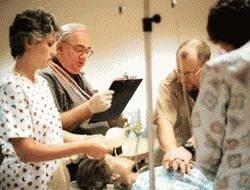Starting to prepare for the end
Published 12:00 am Tuesday, October 9, 2001

- Doc Mahar, a respiratory therapist at St. Elizabeths Health Services, performs CPR on a training dummy. Also attending to the patient are, from left, Valee Gray, Steve Whiting and Bonnie Stalder. Last week, the Better Breathers Club dramatized the importance of filling out advanced directive instructions by staging a code situation for club members, who said they appreciated the demonstration. (Baker City Herald/Mike Ferguson).
By MIKE FERGUSON
Trending
Of the Baker City Herald
They call themselves the Better Breathers Club, but their most recent meeting made club members hold their breath for a while.
Which is exactly what their leader, St. Elizabeth Health Services respiratory therapist Doc Mahar, had in mind.
Trending
Mahar, whos been holding monthly meetings for nearly a year for people living with such diseases as emphysema, launched into a three-part seminar on death and dying last Thursday evening in the most dramatic way he could think of.
With help from some co-workers, he staged a emergency room code situation in which hospital staff worked to revive a patient (actually a training dummy) whod stopped breathing and didnt have a pulse.
The idea, Mahar explained to the class, was to get them thinking about filling out an advanced directive form. The form, popularly called a living will, gives explicit instructions about how far patients or, just as importantly, patients families are willing to allow hospital and emergency responders to go to revive them.
Should CPR be performed, with its attendant possible complications, including fractured ribs and punctured lungs? How will the quality of life issues be considered if the patients brain is without oxygen for too long?
The dramatic scene featured more than just realistic-looking procedures and life-like drama. At one point, Steve Whiting, a respiratory therapist who played an emergency room physician, broke away in mid-treatment to talk with people pretending to be the patients children. When Whiting explained that the prognosis looked bleak, two children did not want their mother to undergo further heroic measures. But a third held out, saying he just wanted his mother back.
She wont ever be the mother you knew, Whiting replied.
After the drama was complete and Whiting emerged from his character, he told the group that if your family has to decide for you, often you will get varying opinions. If that happens, we have to do everything thats humanly possible, and that may not be in the patients best interest. They may end up in a nursing home with a feeding tube down their throat and no idea whats going on.
Filling out the paperwork ahead of time alleviates the family of a lot of heartache.
In a code situation, theres not a lot of time for family bickering, said Valee Gray, the hospitals manager of respiratory care. The window of opportunity can be very short.
Before the dramatic presentation began, Mahar took the audience through the complicated path of deciding on ones plan for advanced directive by likening it to electing whether to get a cherished but aging automobile repaired.
You can, of course, buy a new car, but not a new loved one, he said. But, like a mechanic, a doctor will give you both the best case and worst case scenario. But he doesnt give you a complete rundown of the wide range of complications. Filling in those blanks is your job.
The actors urged club members to discuss advanced directives with their physician, clergy, family members and trusted friends.
Afterward, class member Marge Shankle said the drama made her feel nervous and emotional, but that attending club meetings was the smartest move shed made since she quit smoking after 30 years.
Shankle suffers from COPD, or Chronic Obstructive Pulminary Disease.
I learn more at these meetings, she said, than I did when I was going through all my medical care.
The Better Breathers Club meets the first Thursday each month at 7 p.m. at St. Elizabeth Health Services. For more information, call 523-8133.









